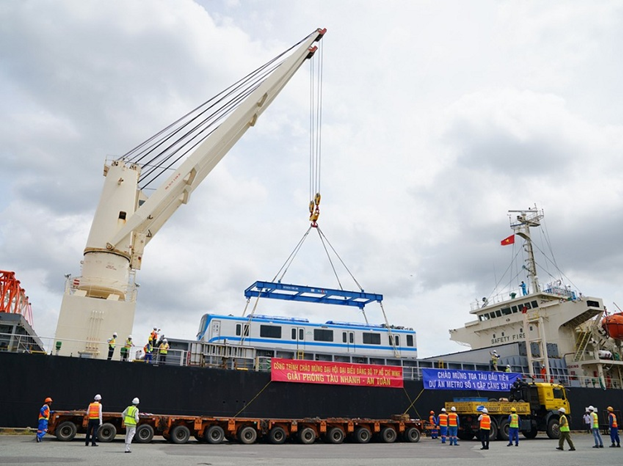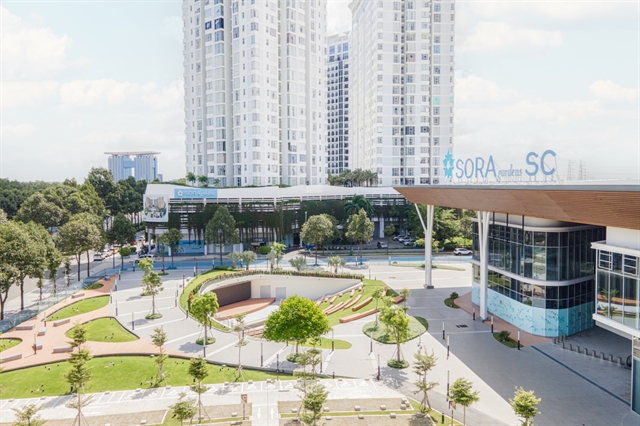 Economy
Economy

 |
| A Becamex Tokyu project in Bình Dương. Photo baobinhduong.vn |
HÀ NỘI — Environmental, Social and Governance (ESG) standards are emerging as a vital 'filter' for real estate projects, helping attract capital and align development with global sustainability goals, experts told a forum held in Hà Nội this week.
Themed 'Implementing ESG in Real Estate – Opportunities and Sustainable Finance Solutions', the event gathered representatives from government agencies, international financial institutions, investors and property developers. Co-hosted by the Việt Nam Green Building Council (VGBC) and GRESB – a global ESG benchmark for real assets – the forum aimed to accelerate the creation of a national ESG framework tailored to the property sector.
“ESG is no longer a slogan – it is a financial passport,” agreed speakers, underlining how leading lenders and institutional investors, from the International Finance Corporation (IFC) to ADB and funds in the EU, US and Japan, are now using ESG criteria to screen projects.
While Việt Nam has taken initial steps to integrate ESG into its policy landscape, much more is needed, according to experts. The country’s Green Growth Strategy (2021–30) recognises ESG as a key pillar for economic transition. However, the absence of a clear and nationally recognised ESG framework for real estate is seen as a major hurdle.
“Banks are ready. But without a national ESG benchmark, they lack a basis to determine which projects qualify for green finance,” said Nguyễn Công Thịnh, Deputy Director of the Department of Science, Technology, Environment and Construction Materials under the Ministry of Construction.
According to the State Bank of Vietnam, 47 financial institutions have already disbursed green loans, with outstanding credit reaching nearly VNĐ600 trillion, or 4.6 per cent of total credit. However, real estate developers still struggle to access green capital due to a lack of certified ESG standards and government incentives.
“Việt Nam has set ambitious goals — 150 green buildings by 2030, and a 74.3-million-tonne CO₂ reduction by 2050,” Thịnh added.
“But to achieve this, we must improve our standards, financial mechanisms, and enforcement capabilities.”
From blueprint to breakthrough
Experts agreed that ESG must be embedded from the earliest stages of real estate development.
“The lifecycle of a real estate project spans decades. If ESG is not integrated from design and construction to operations, we risk falling behind the green transition,” Richard Mark Leech, Deputy CEO of Phú Long Corporation told Việt Nam News.
Leech emphasised that ESG would not be merely a compliance burden.
“Our customers want homes that are energy efficient, well-ventilated, and provide clean water," he added.
"Meeting ESG standards builds trust and long-term brand value.”
A survey by CBRE Việt Nam shows that 65 per cent of homebuyers in HCM City are willing to pay 5–10 per cent more for ESG-certified projects. Green-certified buildings also enjoy higher rental prices - around 4 per cent more than conventional properties.
Jonathan Flexer, CBRE Việt Nam’s Deputy Managing Director, noted that ESG implementation could increase asset value by 10–15 per cent and significantly boost a developer’s access to international capital.
Becamex Tokyu, a joint venture between Becamex IDC and Tokyu Corporation of Japan, is applying ESG standards to its township projects in Bình Dương Province.
Leo Nishimura, Deputy Director of the firm’s Production and Business Department mentioned examples including solar-powered homes, rainwater irrigation, and compost aquaponics systems in its developments.
“We want to bring Japan’s know-how into our projects to create unique, sustainable townships in Việt Nam,” Nishimura told Việt Nam News.
He also highlighted support from Japan’s carbon offset programme for energy-saving initiatives, such as LED lighting and high-efficiency chillers in commercial properties.
However, Nishimura urged the Vietnamese Government to offer stronger policy support and clearer incentives to encourage faster adoption of ESG infrastructure investments.
Experts stressed the need for comprehensive guidance to help businesses adopt ESG.
Nguyễn Hoa Cương, Deputy Director of the Central Institute for Economic Management, said firms needed three things: clear ESG regulations, access to green finance, and tax or land incentives.
“Việt Nam’s ESG implementation remains fragmented and policy support is limited,” he said.
According to a 2024 survey by the Ministry of Planning and Investment, the real estate and banking sectors are leading in ESG adoption, with 19 per cent of firms already practising ESG, compared to 7 per cent in transport and logistics.
Still, challenges remain.
“We have no green credit programmes tailored for green buildings,” said Nguyễn Tùng Anh, Head of Sustainable Finance at FiinGroup.
“Green real estate is highly bankable, it has measurable impacts and strong collateral, but financial products and criteria are lacking.”
Learning from global models, the VGBC pointed to Australia's ESG ecosystem: a national standard, ESG-based bank loans, and investor-led screening. They recommended Việt Nam adopt a similar approach: establish a national ESG code, develop ESG-linked financial instruments, and improve data transparency.
According to the IFC, Việt Nam will require an estimated US$753 billion by 2030 to develop climate-resilient urban and infrastructure projects. Much of this could come from the private sector - if an effective ESG framework is in place.
“This forum is an important step in connecting policy, finance, and business,” said VGBC.
“Our goal is to make ESG not just a buzzword, but a practical standard for evaluating, financing, and executing real estate projects, supporting the Government’s net-zero ambition and building a more resilient, liveable urban future.” — VNS




